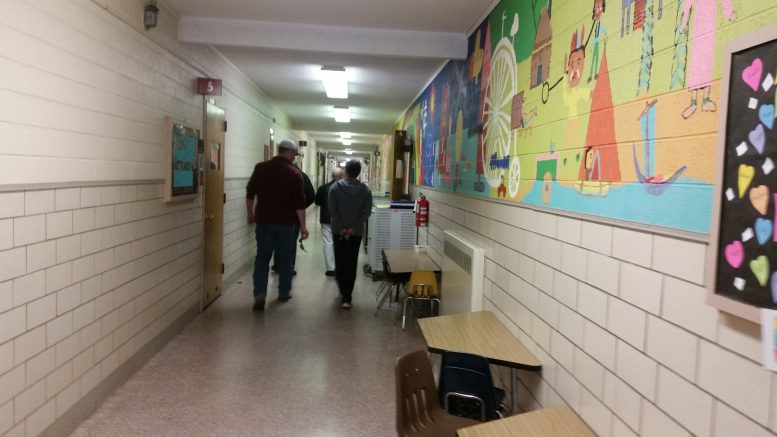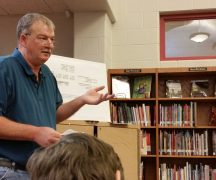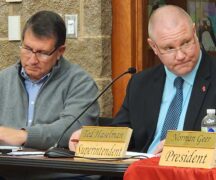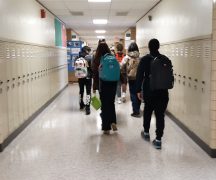By JAN LARSON McLAUGHLIN
BG Independent News
The Bowling Green Board of Education was left bruised and battered Tuesday evening – from both a bitter levy campaign and a biting defeat at the polls.
The district’s second attempt to pass a 5.7-mill bond issue for 37 years went down by a bigger margin than its first loss.
The unofficial total on Tuesday night was 2,845 (40 percent) to 4,218 (60 percent). That compares to November’s vote of 3,471 (46 percent) to 4,021 (54 percent).
“We are very disappointed,” school board President Jill Carr said late Tuesday evening.
“We’re so committed to getting our facilities back to the high quality they were,” Carr said of the $72 million plan to consolidate the three elementaries, plus renovate and add onto the high school. “We wanted the best for students, teachers and community as a whole.”
But many did not like the plan – either because of its effect on their pocketbooks or because it meant the end to “neighborhood” schools.
Steve Bateson, one of those leading the opposition to the levy, issued a statement after the election results were in.
“The voters joined together and spoke, defeating the bond issue for a variety of reasons. Some voters believe neighborhood schools are important, others felt that the additional tax was unfair,” he wrote.
“This bond issue has been defeated twice and we hope the school board respects the decision of the voters and moves forward with a new plan that all members of our school district family can support for the success of our students and community,” Bateson stated.
But finding a plan that all members of the district can support may be difficult. The school board brought in a school taxation expert who said the board’s request for a property tax was the best decision for the majority of the district residents. Principals at the schools offered Saturday tours to the public so show the poor condition of the buildings.
But it wasn’t enough to convince the majority of the voters.
“We are just going to have to step back and try to figure out what the next steps are,” board Vice President Ginny Stewart said. “Obviously the community wants something different.”
The board will continue to work with school taxation expert David Conley to find a funding solution for the district.
Critics of the bond issue has suggested that the $72 million price tag is too much, and could be reduced by renovating the 60-plus-year-old elementaries rather than building one centralized building. The opposition has also criticized the reliance on property taxes, which greatly affect the agricultural community.
Supporters of the plan said the only way to provide equity in education for all elementary students was to build a consolidated school. They backed the property tax as the best way to achieve that goal.
Superintendent Francis Scruci has repeatedly said that the board tried the bond issue again after its defeat in November because it was the best solution for the students, the teachers and the community. But if the voters won’t support it, the board will have to try for something less than the best, he said.
“The board is going to have to make a decision,” Scruci said. “In the next couple weeks we’ll have a better idea.”
Scruci said he has never experienced this type of nasty levy campaign in his previous school districts.
“We’ll have to regroup and see what we’ve learned from this,” he said.
“We feel very strongly that we did everything we could,” Carr said. “We know we have our work cut out for us.”
The negativity directed toward the levy in November was magnified with the second attempt. The organized opposition targeted the school board and superintendent with attacks on their integrity, and billboards and ads urged voters to reject the levy.
The campaign has left some board members feeling battered.
“My hope would be that those in the opposition can rise above the ugliness like the board did,” Carr said.
Stewart agreed.
“I don’t understand why it had to be as vitriolic as it was,” she said. “We took the high ground and chose not to play in their arena. I was very proud, we never wavered.”
Though the board is uncertain of its next steps, one item is a certainty, Stewart said.
“The longer we wait, the more expensive it gets,” she said.





